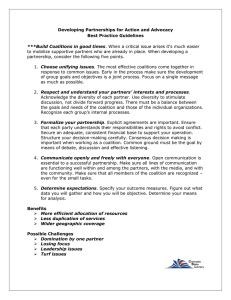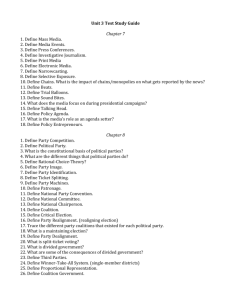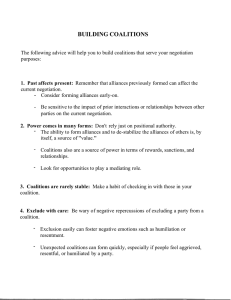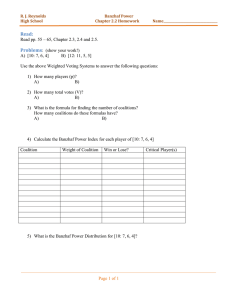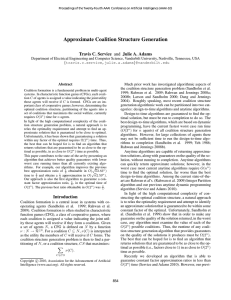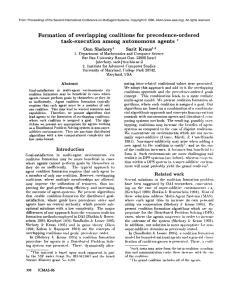Coalition format ion met hods in ... Onn Shechory
advertisement
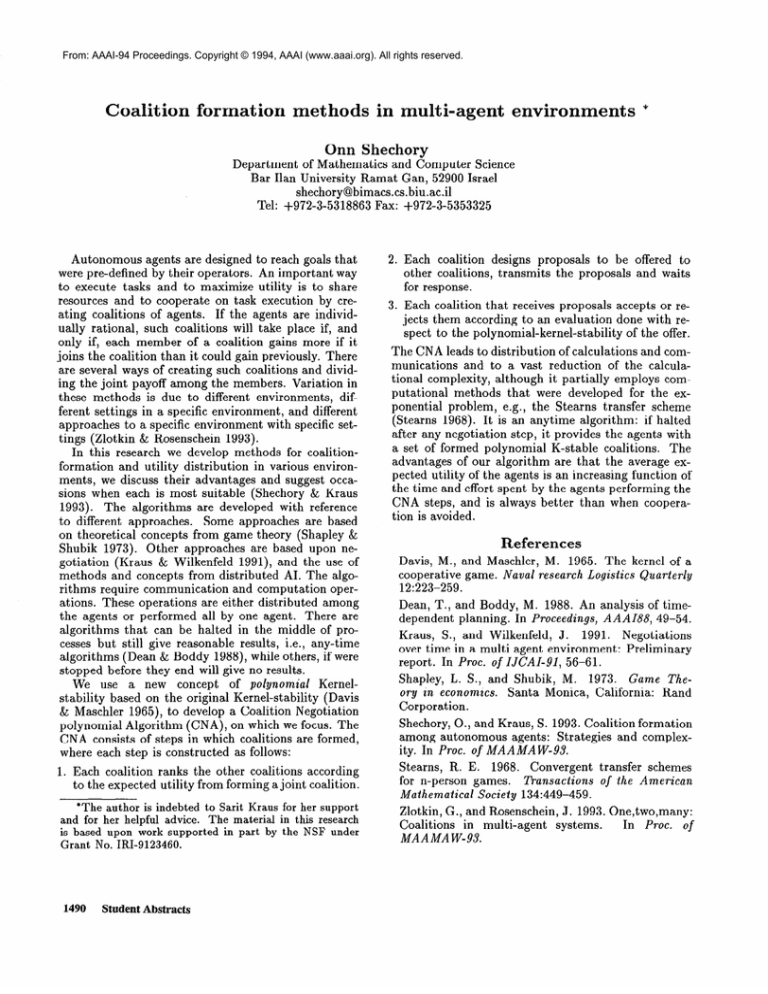
From: AAAI-94 Proceedings. Copyright © 1994, AAAI (www.aaai.org). All rights reserved. Coalition format ion met hods in multi-agent environments * Onn Shechory Department of Mathematics and Computer Science Bar Ban University Ramat Gan, 52900 Israel shechory@bimacs.cs.biu.ac.il Tel: +972-3-5318863 Fax: +972-3-5353325 Autonomous agents are designed to reach goals that were pre-defined by their operators. An important way to execute tasks and to maximize utility is to share resources and to cooperate on task execution by creating coalitions of agents. If the agents are individually rational, such coalitions will take place if, and only if, each member of a coalition gains more if it joins the coalition than it could gain previously. There are several ways of creating such coalitions and dividing the joint payoff among the members. Variation in these methods is due to different environments, different settings in a specific environment, and different approaches to a specific environment with specific settings (Zlotkin & Rosenschein 1993). In this research we develop methods for coalitionformation and utility distribution in various environments, we discuss their advantages and suggest occasions when each is most suitable (Shechory & Kraus 1993). The algorithms are developed with reference to different approaches. Some approaches are based on theoretical concepts from game theory (Shapley & Shubik 1973). Other approaches are based upon negotiation (Kraus & Wilkenfeld 1991), and the use of methods and concepts from distributed AI. The algorithms require communication and computation operations. These operations are either distributed among the agents or performed all by one agent. There are algorithms that can be halted in the middle of processes but still give reasonable results, i.e., any-time algorithms (Dean & Boddy 1988), while others, if were stopped before they end will give no results. We use a new concept of polynomial Kernelstability based on the original Kernel-stability (Davis & Maschler 1965), to develop a Coalition Negotiation polynomial Algorithm (CNA), on which we focus. The CNA consists of steps in which coalitions are formed, where each step is constructed as follows: 1. Each coalition ranks the other coalitions according to the expected utility from forming a joint coalition. *The author is indebted to Sarit Kraus for her support The material in this research and for her helpful advice. is based upon work supported in part by the NSF under Grant No. IRI-9123460. 1490 Student Abstracts 2. Each coalition designs proposals to be offered to other coalitions, transmits the proposals and waits for response. 3. Each coalition that receives proposals accepts or rejects them according to an evaluation done with respect to the polynomial-kernel-stability of the offer. The CNA leads to distribution of calculations and communications and to a vast reduction of the calculational complexity, although it partially employs computational methods that were developed for the exponential problem, e.g., the Stearns transfer scheme (Stearns 1968). It is an anytime algorithm: if halted after any negotiation step, it provides the agents with a set of formed polynomial K-stable coalitions. The advantages of our algorithm are that the average expected utility of the agents is an increasing function of the time and effort spent by the agents performing the CNA steps, and is always better than when cooperation is avoided. References Davis, M., and Maschler, M. 1965. The kernel of a cooperative game. Naval research Logistics Quarterly 12:223-259. Dean, T., and Boddy, M. 1988. An analysis of timedependent planning. In Proceedings, AAAI88, 49-54. Kraus, S., and Wilkenfeld, J. 1991. Negotiations over time in a multi agent environment: Preliminary report. In Proc. of IJCAI-91, 56-61. Shapley, L. S., and Shubik, M. 1973. Game TheSanta Monica, California: Rand ory in economics. Corporation. Shechory, O., and Kraus, S. 1993. Coalition formation among autonomous agents: Strategies and complexity. In Proc. of MAAMAW-93. Stearns, R. E. 1968. Convergent transfer schemes for n-person games. Transactions of the American Mathematical Society 134:449-459. Zlotkin, G., and Rosenschein, J. 1993. One,two,many: Coalitions in multi-agent systems. In Proc. of MAAMA W-93.
